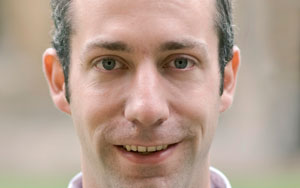
 Dr Axel Zeitler
Dr Axel Zeitler
PhD, Pharmacy
German-born Axel Zeitler loves New Zealand. But it did seem very far away. So while he had “greatly enjoyed” the semester he spent here undertaking a Postgraduate Certificate in Pharmacy, he felt nervous about relocating to the south side of the globe for the duration of a PhD. But when Otago's Department of Pharmacy proposed a joint project with Cambridge University, looking at using laser technology to investigate the structure of pharmaceuticals, it felt the like the perfect solution for Axel.
It created a situation where Axel – based in Cambridge – had three supervisors across two universities and was working in an interdisciplinary field involving chemistry, pharmacy and physics. Says Axel: “It all went surprisingly smoothly.”
The key to the success of the collaboration was flexibility, particularly at an administrative level, believes Axel, and he urges other students attempting to straddle two academic communities in this way “to find out what the enrolment requirements are very clearly in advance”.
“The universities needed to be quite accommodating, and I certainly appreciated the efficient, problem-solving approach Otago demonstrated.”
Further, his supervisors had distinct areas of expertise and roles within the supervision team, “so there was never any conflict”.
Academically, “There was lots of room to go off in different directions. I spent the first year and a half exploring the subject quite widely, doing all sorts of experiments. Then I met my Otago supervisor and had the conversation, 'OK, how are we going to turn all this into a PhD?' We made some decisions, and I got on with it.”
Axel became the king of the long-distance relationship, keeping his Otago supervisor up to date via email, teleconference, formal yearly progress reports and meeting at international conferences.
He says it was an advantage working in an area with little previous research. And although the infancy of the field could have been daunting, Axel believes his best research came from not taking it all too seriously.
“When it comes to experiments, give things a try. That's what experimenting is all about. If something doesn't work, at least you'll know it doesn't work.”
Above all, says Axel, “Be curious. Keep your mind open, and be receptive to new information. Go to lots of seminars, even if they're not directly in your area, and don't be afraid to ask simple questions. Having a broad knowledge of your field and beyond can be useful in all sorts of unexpected ways. And it keeps the experience of learning interesting.”
Axel's thesis has been formally recognised by the Division of Health Sciences as being of exceptional quality.